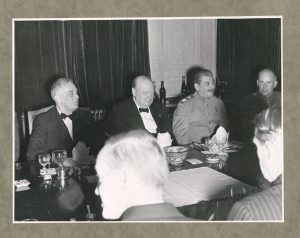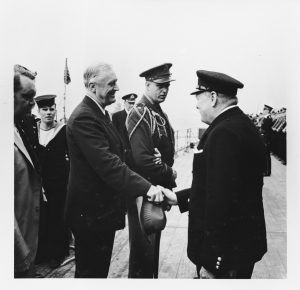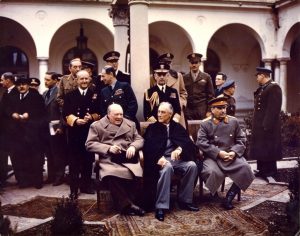
Finest Hour 172
Democracy’s Champions: Churchill and Roosevelt
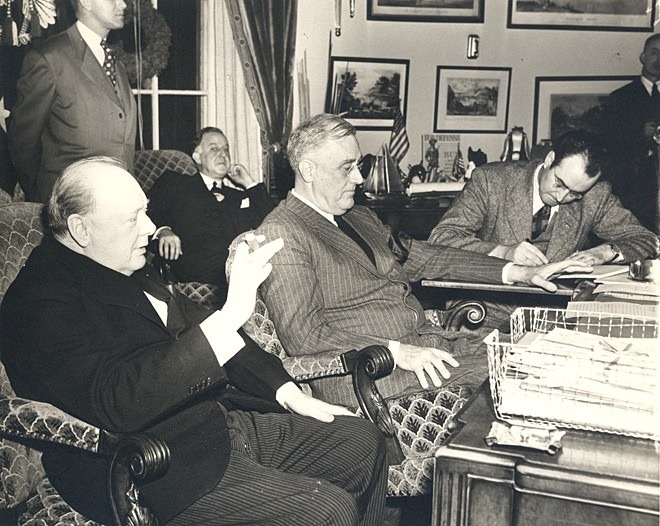
June 8, 2016
Finest Hour 172, Spring 2016
Page 06
By Alonzo L. Hamby
Their first meeting was not promising. In the summer of 1918, fifteen months after the United States had entered the First World War, Franklin D. Roosevelt, the American Assistant Secretary of the Navy, crossed the Atlantic to undertake an inspection tour of US naval bases and Marine combat in Europe. His first stop was London. On the evening of 29 July, he was one of the guests at a formal dinner in honor of the British war ministers. It was there that he had his first personal encounter with Winston Churchill.
Exactly what transpired is unclear. One has an impression of two big egos competing for attention. Churchill quickly forgot the event. Roosevelt nursed his annoyance. Twenty-one years later, he told Joseph P. Kennedy that Churchill had “acted like a stinker” toward him.1
Their contacts over those years were few and perfunctory. Most notably, Churchill gave President Roosevelt a copy of his multi-volume biography of the first Duke of Marlborough. Roosevelt thanked him and seems never to have gotten around to reading it. Surely, however, the president sympathized with Churchill’s opposition to Prime Minister Neville Chamberlain’s policy of appeasing Nazi Germany. In September 1939, a few days after the Second World War broke out in Europe, Roosevelt sent messages to Chamberlain and Churchill, who was back in the government as First Lord of the Admiralty, inviting them to stay in touch with him on matters of mutual concern. Chamberlain did not respond. Churchill, who asked for and received permission from the Cabinet, did. Neither man could have imagined that an initial brief exchange was the first of nearly 2,000 communications that would pass between them over the next five and a half years. Nor could they have foreseen the way in which an alliance of necessity would develop into a fruitful but ambiguous personal relationship.2
Alliance Emerging
An indication of the developing alliance came in mid-1940 after Churchill had replaced Chamberlain as Prime Minister. Roosevelt remarked to a Cabinet meeting that “he supposed Churchill was the best man England had even if he was drunk half of his time.”3 The new British leader pressed hard for major military assistance in the form of a transfer of American destroyers to the British navy. That September he and Roosevelt consummated the “destroyer deal” which gave the British fifty modernized, but old, destroyers in return for ninety-nine-year leases on eight British military bases in the Western hemisphere.

2024 International Churchill Conference
Sensational and controversial at the time, the destroyer deal was actually a symbolic band-aid. The more urgent crisis had to wait until Roosevelt won election to a third term that November. Britain was running out of dollars to pay for American supplies. On 8 December 1940, Churchill formally told the president: “The moment approaches when we shall no longer be able to pay cash for shipping and other supplies.” The news was anticipated. Roosevelt quickly responded with a program to “eliminate…the silly foolish old dollar sign” by lending or leasing military supplies to Britain.4
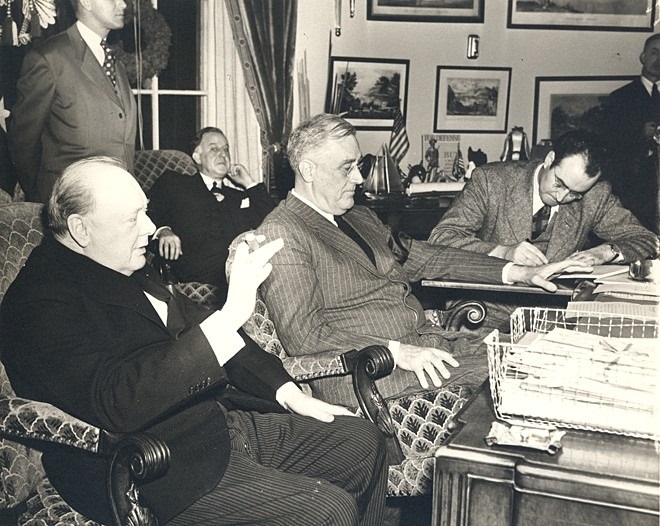
The destroyer deal and Lend-Lease were critical in keeping Britain afloat through 1941. That August, Roosevelt and Churchill staged a personal meeting on warships just off Argentia, Newfoundland. The most memorable public side of the meeting was Churchill’s idea—a religious service held on the deck of the British warship Prince of Wales. Newsreels showed FDR and the Prime Minister leading American and British sailors in the great hymn “Onward Christian Soldiers.” It left an impression of warriors joined in a crusade against the forces of evil.5
The two leaders proclaimed a joint declaration of common liberal principles that a British newspaper dubbed “the Atlantic Charter.” It rejected territorial aggrandizement, affirmed national self-determination, and promised “improved labor standards, economic advancement, and social security.” Churchill had his doubts about it. Roosevelt knew that the American public needed grand objectives to justify the war toward which he was guiding America.
The main purpose of the rendezvous was to bring the two leaders together on a personal basis. In this it was a grand success. Privately writing to his cousin Daisy Suckley, Roosevelt wrote of Churchill: “He is a tremendously vital person….I like him.”6 The personal rapport obscured important differences of opinion about the nature and objectives of the war. Churchill wanted the preservation of an old order in which the sun never set on Britain’s vast and (as he saw it) benevolent empire. Roosevelt envisioned a world liberated from (as he saw it) exploitative European imperialism and responsive to American influence.
The Japanese attack on Pearl Harbor that December brought the United States fully and openly into the war. It also brought Churchill to the United States, eager to formalize the relationship that had been developed and hoping to seize control of the conflict’s grand strategy. Traveling across the Atlantic, he hoped to steer direction of the war. He wrote strategy papers that placed a priority on clearing the Atlantic and the Mediterranean (Britain’s lifeline to Suez and its South Asian empire), called for a delaying action against Japan in the Pacific while building an enhanced naval capability there, and projected 1943 as the target year for an invasion of the European continent.
By and large, American planners agreed with Churchill’s priorities but hoped unrealistically for an invasion of the continent in 1942. The two nations agreed to a unified military command structure that would be based in Washington. They also pulled together an alliance of twenty-six countries actively at war with Germany or Japan, several governments-in-exile, and a number of Caribbean republics. On 1 January 1942, the alliance, calling itself the United Nations, issued a declaration reaffirming the principles of the Atlantic Charter.
Churchill spent three weeks in the United States. At a personal level, he and Roosevelt liked each other, but Roosevelt remained convinced that the British Empire was an exploitative enterprise that victimized subjugated peoples. On 13 January 1942, the president hazed him at a small White House dinner party. One of the guests, the noted liberal author Louis Adamic, recalled the president’s words a few years later: “You know my friend over there doesn’t understand how most of our people feel about Britain and her role in the life of other peoples…. [W]e’re opposed to imperialism—we can’t stomach it….” Churchill took it all, jaw clinched, silent, and impassive.7
The next day, as Churchill departed for England, the president said “Trust me to the bitter end.”8 Whatever their differences, he continued to be a generous and supportive ally. The professional military relationship between America and Britain would function smoothly for the duration of the war. The personal respect and affection between their leaders would ebb and flow but would never be in danger of collapse.
Alliance Forged
Churchill returned to America in June 1942, to settle a squabble between American and British military leaders over whether to attempt an invasion of Europe in 1942 or stage a peripheral attack in North Africa. The conferences that followed in Washington won Roosevelt over. He settled on North Africa and firmly brought his military chiefs into line.
Roosevelt and Churchill met again two months after the American invasion of North Africa in January 1943, at Casablanca. With German submarines still infesting the Atlantic, both men flew to their destination—Churchill directly from England, Roosevelt far more circuitously to Brazil, then across the Atlantic to the British colony of Gambia before making a hop to his final destination. He saw nothing of Gambia beyond a car ride through its capital, Bathurst, but someone had done research for him. He wrote to a friend that Bathurst was a “hellhole.” He told his son Elliott that its native people were treated worse than livestock. In the postwar world, he continued, a new international organization would force the Europeans to treat their colonial subjects decently and lay the groundwork for their eventual independence. In Churchill’s presence, he told the sultan of Morocco to beware of European imperialists. As before, Churchill refused to take the bait.9
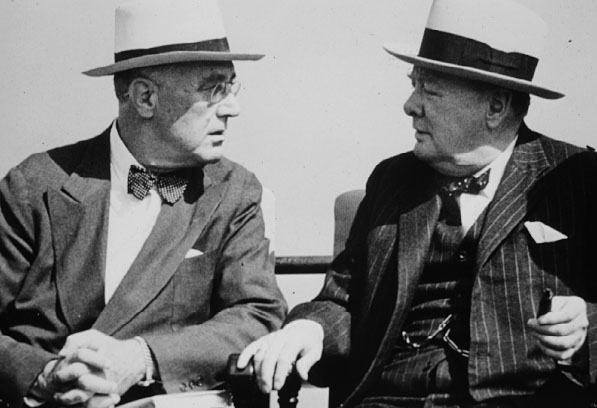
At the end of the conference, Roosevelt, without consulting his partner in advance, told the press that the Allies were committed to a policy of “unconditional surrender.” Then, at Churchill’s instigation they drove to Marrakesh, had a pleasant dinner, and enjoyed a view of the Atlas Mountains. Early the next morning, as the president took his leave, the prime minister, roused from his sleep, donned a heavy robe emblazoned with a large dragon, and saw his friend off at the airport.
The tide of the war in North Africa was turning. A British offensive from El Alamein in the east and a three-pronged American invasion from the west would push Axis armies off the continent by early May. A British-American invasion of Italy would follow in July. Churchill and Roosevelt met again that August in Quebec to discuss the progress of the war. By then, they also were sparring a bit over Roosevelt’s interest in developing a close relationship with Soviet dictator Josef Stalin. Roosevelt denied (falsely) that he had attempted to arrange a private meeting with the Russian leader.
The Soviet victory at Stalingrad had been followed by a steady Red Army push westward. By late fall, Churchill and Roosevelt needed to settle grand strategy for the war against Germany in the west and to coordinate with Stalin on the fight in the east. Conferences at Cairo and Teheran dealt with both imperatives.
The meetings at Cairo, before and after Teheran, largely confirmed Churchill’s immediate objective of consolidating the Allied grip on the Mediterranean. The major accomplishment of the conference was agreement that American and British forces would stage an invasion of Northern Europe in the spring of 1944.
Churchill, long a vocal foe of Bolshevism, already had met Stalin personally, taken his measure, and forged a wary alliance with him. Roosevelt, much more friendly in his attitude toward the Soviet Union, had pursued a lengthy correspondence with Stalin and wanted to be the linchpin in a relationship with both the Old Tory and the Old Bolshevik. At Teheran in November 1943, he met privately with Stalin and seized on opportunities to needle Churchill.
Alliance in Decline
After Teheran, the Allied war effort moved vigorously and successfully. The Red Army pushed the Germans back in the east and the US-British invasion of Normandy in June 1944 initiated an Allied offensive in the west. That October, Churchill, still strongly concerned with British hegemony in the Mediterranean, was back in Moscow negotiating a sphere-of-influence agreement with the Russians. It essentially conceded Soviet control of most of the region. Two exceptions were Yugoslavia, in which the two nations would exercise equal influence, and Greece, which Churchill deemed vital to British dominance in the Mediterranean. The accord assumed continued Turkish independence. When word leaked of it in the United States, the Roosevelt administration neither supported nor condemned it, but few politicians—Democratic or Republican—had good words for it.
In late 1944, Communists attempted to seize power in Greece. Disregarding Roosevelt’s qualms, which reflected those of American liberals, Churchill employed British troops and naval artillery against the insurgents. For a time, the US-British alliance seemed headed for a crisis, but by the end of the year the insurgency was quelled. Both leaders were ready to move on to urgent alliance issues as the European war moved into its final phase.
They met face-to-face again, 2 February 1945 at Malta, en route to a fateful meeting with Stalin at Yalta. Churchill hoped to develop a common negotiating position. Roosevelt was determined to avoid further commitments to Britain and perhaps had decided that Churchill was irrelevant. Declaring that he wanted to avoid any appearance of “ganging up on Stalin,” he spent the day touring the island. At Yalta, Roosevelt, intent on securing Soviet entry into the war against Japan and participation in the planned new United Nations organization, displayed little interest in British objectives.10
Without telling Churchill of his next destination, FDR went to the Great Bitter Lake of the Suez Canal, where he met with King Abdul Aziz (Ibn Saud) of Saudi Arabia. The encounter was the capstone of an effort to establish an American presence and secure oil concessions in what had been an area of British interest. It may not have occurred to the president that he was practicing a brand of imperialism himself. Churchill quickly scheduled his own audience with the monarch. On his way to it, he stopped in Alexandria for a final meeting with Roosevelt, whom he later described as “placid and frail,” possessing only “a slender contact with life.”11
Difficulties with the Soviet Union on a number of issues persisted. Roosevelt remained optimistic. On 11 April 1945, he wrote to Churchill: “I would minimize the general Soviet problem as much as possible…problems, in one form or another, seem to arise every day and most of them straighten out….We must be firm, however, and thus far our course is correct.”12 The next day, he died of a massive cerebral hemorrhage.
Churchill, perhaps for reasons of his own shaky health, decided at the last minute against a flight to the United States for the funeral. On 17 April he delivered a tribute in the House of Commons: “In Franklin Roosevelt there died the greatest American friend we have ever known, and the greatest champion of freedom who has ever brought help and comfort from the new world to the old.”13 His remarks simplified a complex and occasionally difficult relationship, but also voiced a larger truth that transcended the disagreements between democracy’s two greatest statesmen.
Alonzo Hamby, Distinguished Professor Emeritus of History at Ohio University, is the author most recently of Man of Destiny: FDR and the Making of the American Century (Basic Books, 2015), from which this article is excerpted.
Endnotes
1. Amanda Smith, ed., Hostage to Fortune: The Letters of Joseph P. Kennedy (New York: Viking Press, 2001), p. 411.
2. Roosevelt [hereafter FDR] to Winston Churchill [hereafter WSC], 11 September 1939, in Warren F. Kimball, ed., Churchill and Roosevelt: The Complete Correspondence, 3 vols. (Princeton, NJ: Princeton University Press, 1984), vol. I, pp. 26–27 [hereafter Kimball, Churchill and Roosevelt]; Jon Meacham, Franklin and Winston: An Intimate Portrait of an Epic Friendship (New York: Random House, 2003), ch. 2.
3. Ickes, Diary, 12 May 1940, Library of Congress, quoted in Meacham, Franklin and Winston, p. 47. This quote was omitted from the published Ickes diaries.
4. WSC to FDR, 7 December 1940, Kimball, Churchill and Roosevelt, vol. I, pp. 102–11; New York Times, 18 December 1940.
5. For this and the following paragraph, Theodore A. Wilson, The First Summit: Roosevelt and Churchill at Placentia Bay, 1941, rev. ed. (Lawrence: University Press of Kansas, 1991), passim.
6. Geoffrey C. Ward, ed., Closest Companion: The Unknown Story of the Intimate Friendship between Franklin Roosevelt and Margaret Suckley (Boston: Houghton Mifflin Company, 1995), p. 141.
7. Louis Adamic, Dinner at the White House (New York: Harper & Brothers, 1946), pp. 64 and 68.
8. Martin Gilbert, Churchill: A Life (New York: Henry Holt, 1991), p. 715.
9. Elliott Roosevelt, As He Saw It (New York: Duell, Sloan and Pearce, 1946), pp. 75–76 and 109–12.
10. S. M. Ploky, Yalta: The Price of Peace (New York: Viking Press, 2010) for Malta encounter and Yalta proceedings.
11. Winston Churchill, Triumph and Tragedy (Boston: Houghton Mifflin Company, 1953), p. 397.
12. FDR to WSC, 11 April 1945, in Kimball, Roosevelt and Churchill, III, p. 630.
13. Gilbert, pp. 835–36; “Winston Churchill pays tribute to Franklin D. Roosevelt,” http://ww2today.com/17-april-1945-winston-churchill-pays-tribute-to-franklin-d-roosevelt.
Subscribe
WANT MORE?
Get the Churchill Bulletin delivered to your inbox once a month.
